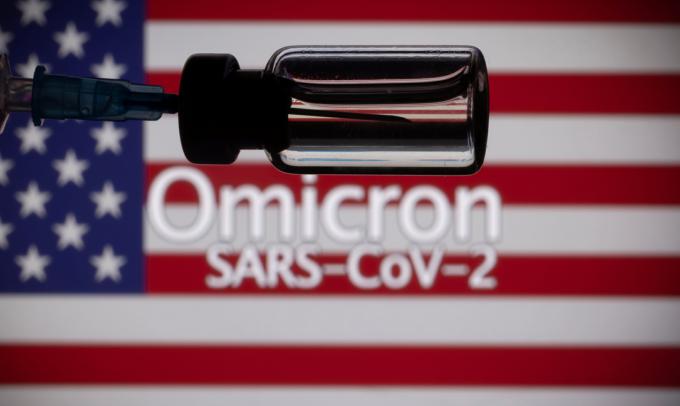
Culture
Even if it feels like the cold darkness of night grows longer and deeper, we know that the Light is always ahead.
As we've started a new Liturgical Year, it seems we've also begun a new phase in the COVID-19 pandemic. By now, we've all heard the news of the Omicron variant, first identified by dutiful health professionals in South Africa. Both of us writing this piece are frontline physicians who see severe COVID-19 cases face-to-face on a daily basis. It is a sad sight to behold: patients on oxygen and struggling to breathe, sometimes going to the ICU and dying in isolation. We've seen time and again what happens when people think it's "just the flu," forgoing the vaccine or attending large unmasked social events (that sometimes lead to dozens of infections). We've seen unvaccinated patients in their 30s who go to the ICU and succumb to the illness, leaving young children without a father or mother.
For us as Catholic frontline healthcare workers, the arrival of the vaccines was an answer to prayers. Study after study has shown stronger protection than we had even hoped for, reducing the risk of hospitalization and death approximately 10-fold. As a comparison, seatbelts (which we all readily agree to) reduce the risk of death and serious injury only 1.5-fold. Many of us physicians had expected that the shot would be less protective overall, similar to the annual flu vaccine. (Although, as an aside, the flu vaccine typically does offer decent protection, so we encourage everyone to get their flu shots, since influenza cases are on the rise).
Every frontline Catholic physician we know is encouraging the vaccine, and we're all grateful to Cardinal Seán O'Malley and his fellow bishops for doing the same. We know that this is an ethical and charitable choice. The Pontifical Academy for Life and the U.S. Council of Catholic Bishops have both instructed Catholics that it is ethically permissible to receive these vaccines, though we should lobby for vaccines without any connection to fetal cell lines. As a concrete act, we suggest that Catholics can donate to groups, such as the John Paul II Medical Research Institute, which are working on developing vaccines and cell lines without any connection to aborted fetal tissue. Both Pope Francis and Pope Emeritus Benedict have themselves been vaccinated against COVID-19, with the Supreme Pontiff instructing us that vaccination is an "act of love," showing how we "care for one another, especially the most vulnerable." Although some traditional Catholics without medical training have remained skeptical, even Father Arnaud Selegny, secretary general of the Society of St. Pius X, has agreed that "it is not immoral to be vaccinated" when there is a proportionate reason; and he has given many examples of acceptable remote cooperation with evil, citing St. Paul (1 Cor. 8:1). Similarly, Father Matt Schneider, LC, has pointed out that many of our daily activities, such as banking, have more proximal cooperation with evil than the mRNA vaccines. Indeed, almost all over-the-counter and prescription medications used today were tested with the same HEK293 cell line that was used for the development of the Pfizer and Moderna vaccines. In brief, science has shown that the COVID-19 vaccines are our strongest protection against severe illness and death, and good theology has confirmed that a Catholic is making an ethical, even charitable, decision in becoming vaccinated.
Given the above, we'll admit that we've been emotionally a bit shaken by the prospect of a new Omicron variant, which might evade vaccine immunity or prior natural immunity, or be more contagious, or be more severe. We shudder to think of watching more people (especially the most vulnerable) struggling to breathe and with coughing fits.
But there is ample reason to hope. On the scientific level, simply because there are many mutations does not necessarily mean that a variant will be worse ('in vitro' is different than 'in vivo'). Call us optimists, but it's entirely possible that this Omicron variant is more contagious but also more mild -- covering more people with natural immunity without hospitalizing or killing as many as Delta has. Of course, it's also quite possible that the virus will be worse than Delta in every way. Fortunately, preliminary reports of physicians from South Africa suggest that -- at least in their initial cohort of young patients -- symptoms have not been more severe than the Delta variant. The question of severity remains too early to tell; hospitalization usually occurs later in the illness.
Regardless of the severity of Omicron, and the inevitable future variants that will follow it, we are in a better place than we were in the first surge in early 2020 and the more recent Delta surge, which has killed and hospitalized so many of the unvaccinated. We have thus-far-quite effective and safe vaccines, which can be quickly tweaked to match the new variant if necessary. We remain hopeful that our current vaccines will still offer reasonable protection against both severe illness and death. We have approved medical therapies, and more on the way. Our hospitals are better stocked with the necessary protective and life-saving equipment, and our medical staff are better experienced in treating COVID. We have many testing centers, and even take-home antigen tests that people can order easily online. We all have masks and hand sanitizer at home. Human respiratory droplets aren't getting any smaller, and we have good data that masks work. So, we don't expect we'll be needing to close hair salons or churches again. We know what to do, and responsible people in the community have again and again shown the willingness to make small sacrifices, such as wearing masks, to help protect their fellow humans. Earlier this week, one of us joined a panel of pro-life medical and ethical experts in Ireland (including two Dominicans, one of whom is a physician) speaking about COVID-19 vaccines, and we were warmed by seeing how we're all in this together, all across the globe. We can do this, even if Omicron is severe.
And on a spiritual note: we always have reason to hope. We have just celebrated the Catholic "New Year," starting the Advent Season, the season of hope. Christmas is coming. God loves us more than we can possibly know. Of course, He expects us to take care of ourselves and others, to care for our body as a "temple of the Holy Spirit" (1 Cor. 6:19). Thus, we must avoid activities like smoking, binge drinking or eating, and drunk or reckless driving. We must take basic precautions to avoid catching and spreading this plague. But God can and does make good come of suffering, especially if we approach it with love and self-sacrifice. We can recall Mother Teresa in Kolkata and St. Maximilian Kolbe in Auschwitz. More significantly, we can recall our blessed Lord being born in a cold stable, or even dying on a cross.
Even if it feels like the cold darkness of night grows longer and deeper, we know that the Light is always ahead. The crescendo of Advent candles point to that Light. Yes, there's an Omicron right now, but He alone is the Alpha and the Omega, the first and the last. Maranatha! Come, Lord!
THOMAS HEYNE, MD, MST, IS A HOSPITALIST PHYSICIAN AT MASSACHUSETTS GENERAL HOSPITAL, AND FACULTY AT HARVARD MEDICAL SCHOOL. HE HOLDS A MASTER'S IN THEOLOGY AND IS A CANDIDATE FOR THE PERMANENT DIACONATE IN THE ARCHDIOCESE OF BOSTON.
DEACON TIM FLANIGAN, MD, IS AN INFECTIOUS DISEASE PHYSICIAN AT RHODE ISLAND HOSPITAL, PROFESSOR OF MEDICINE AT BROWN UNIVERSITY, AND AUTHOR OF OVER 200 PEER-REVIEWED RESEARCH ARTICLES. HE HOLDS A MASTER'S IN THEOLOGICAL STUDIES AND IS A PERMANENT DEACON IN THE DIOCESE OF PROVIDENCE.
The views expressed here are the authors' own; they do not speak for their institutions.
Recent articles in the Culture & Events section
-
Scripture Reflection for April 14, 2024, Third Sunday of EasterDeacon Greg Kandra
-
St. Helena's House is established in the South EndThomas Lester
-
Is this synodality?Russell Shaw
-
Poking the hornet's nest of IVFFather Tadeusz Pacholczyk
-
A eucharistic word: MissionMichael R. Heinlein


















